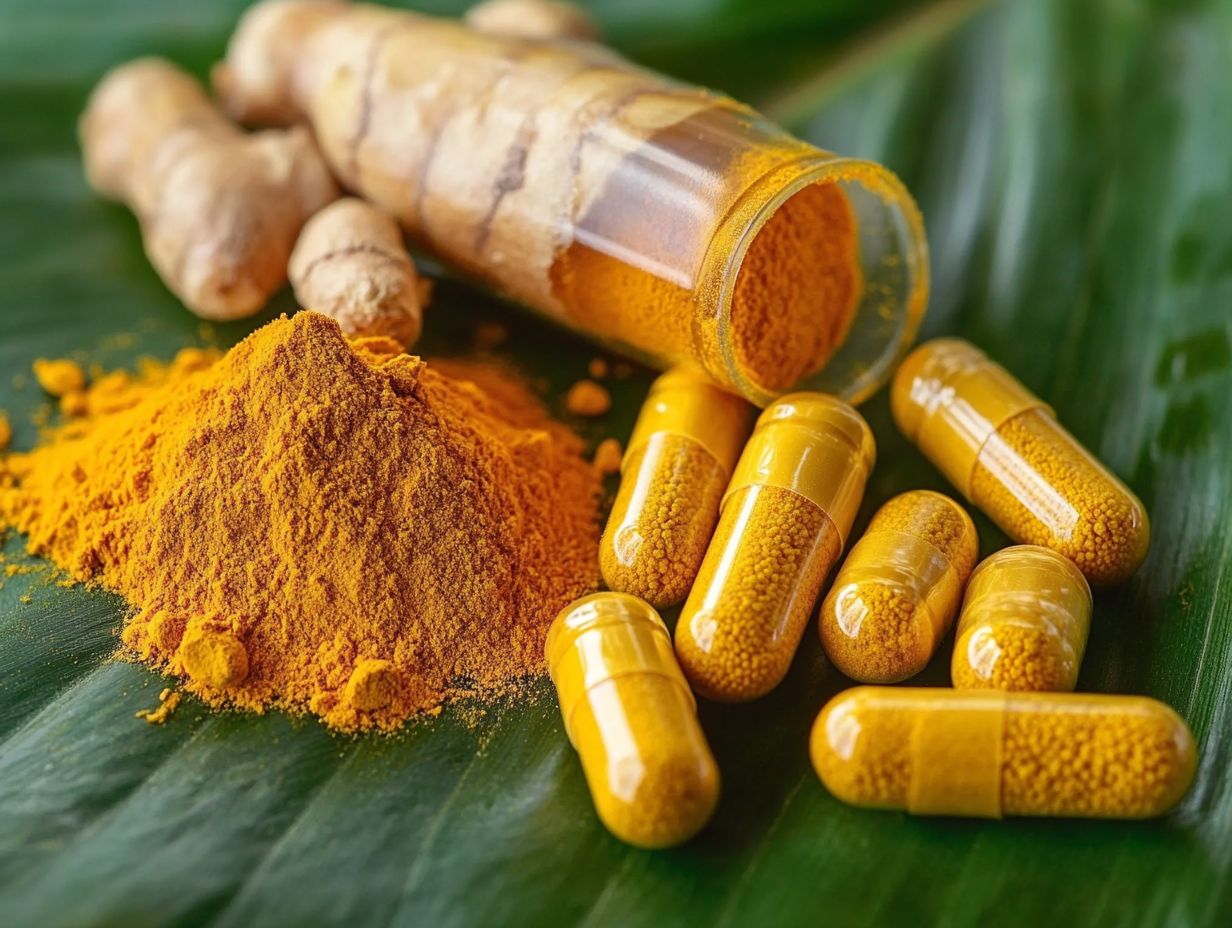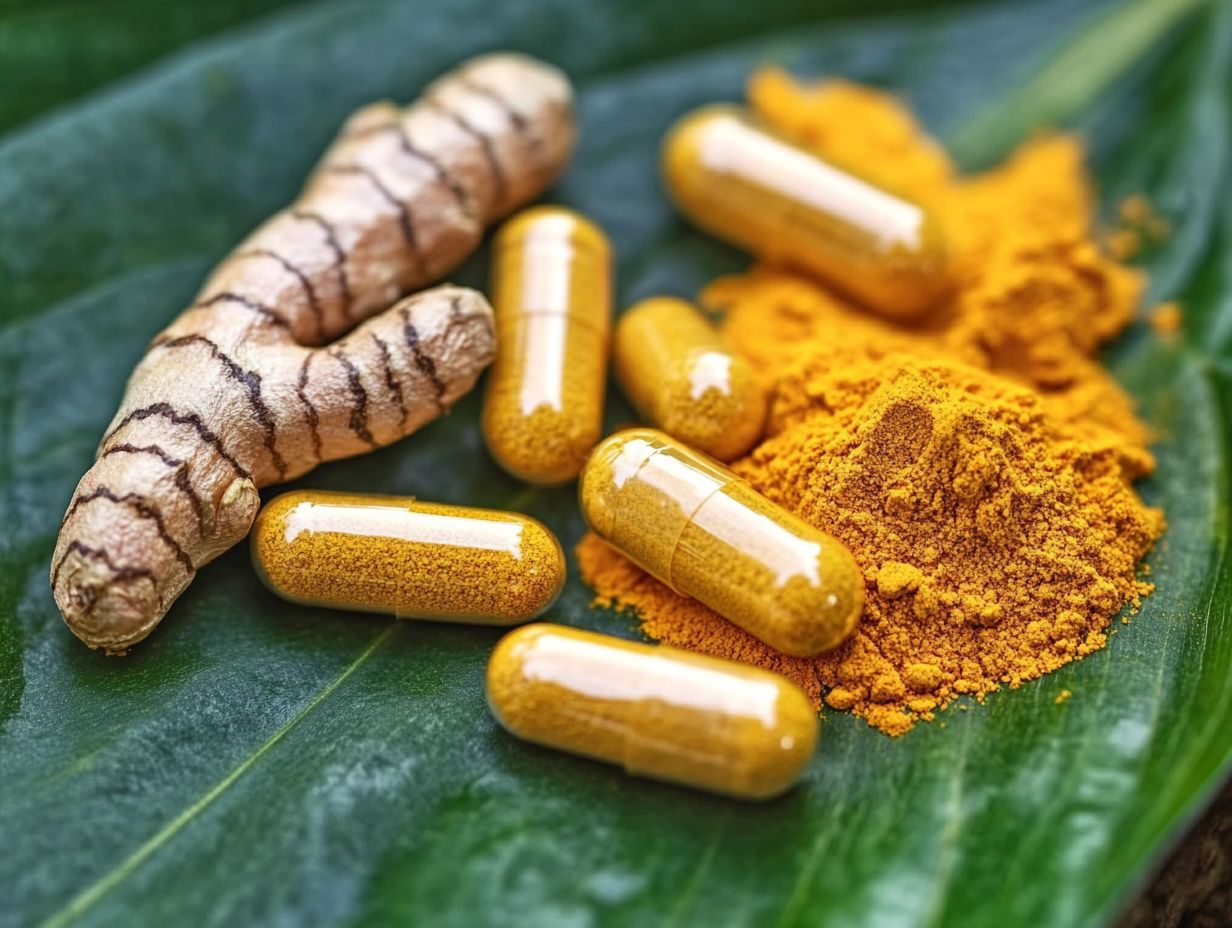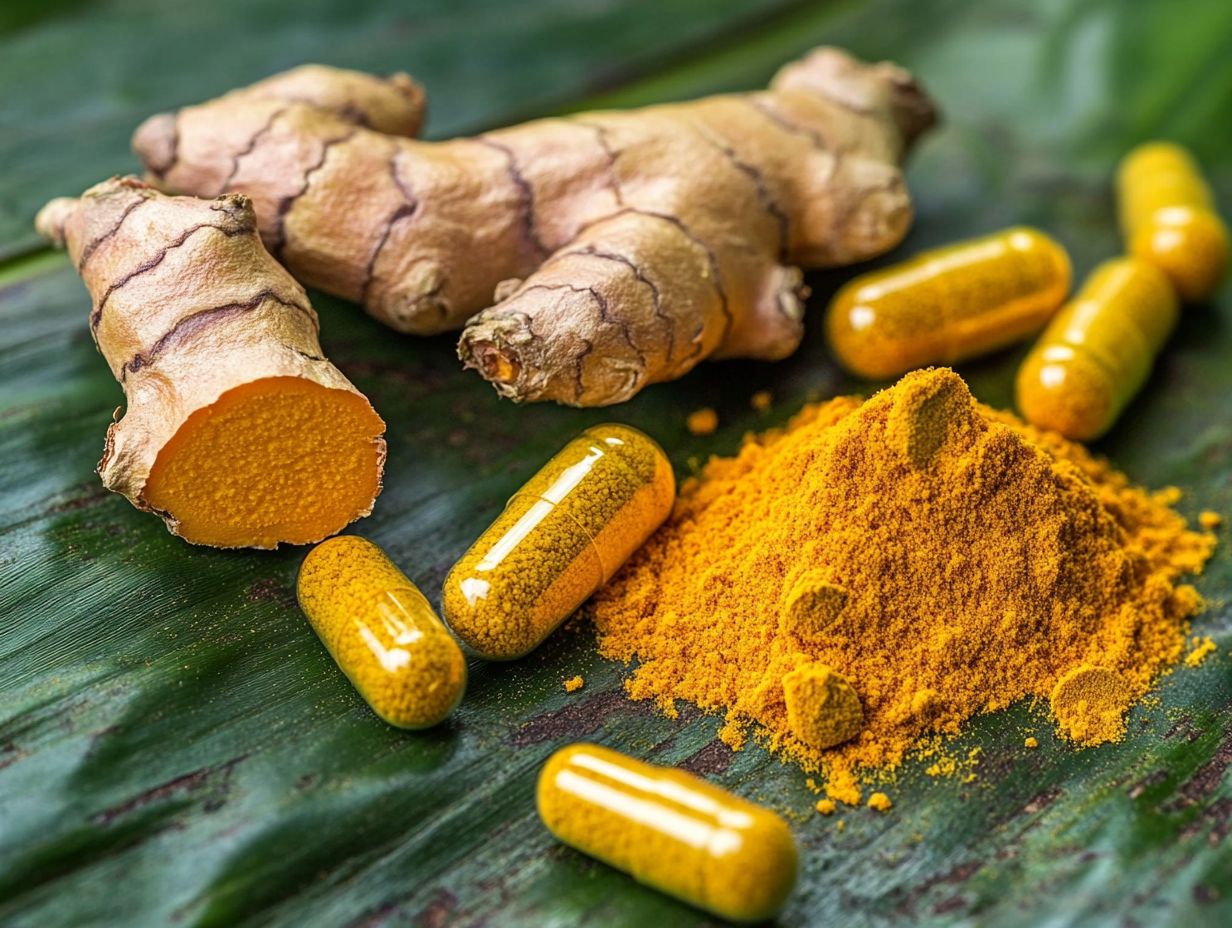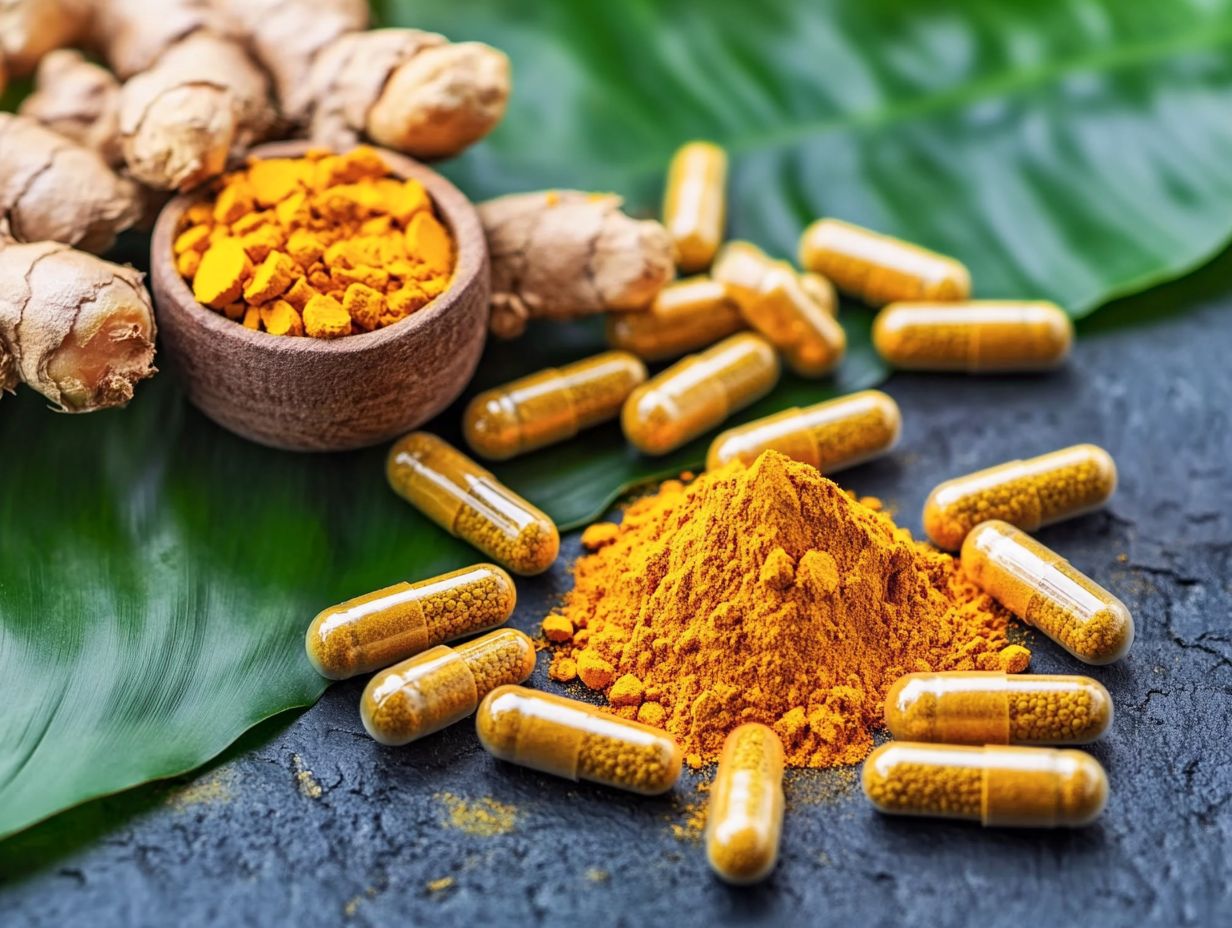The Benefits of Turmeric Supplements for Inflammation
Inflammation is your body’s natural response. It can become a concern if it lasts too long or happens too often. Understanding the causes of inflammation is crucial for managing your health effectively.
This article delves into turmeric, a potent anti-inflammatory supplement. You ll discover its unique properties and the many health benefits it offers.
We ll guide you in selecting the right turmeric supplement, recommend appropriate dosages, and discuss potential side effects.
Explore how this golden spice might be your secret weapon against inflammation and a way to boost your overall well-being.
Contents
- Key Takeaways:
- Understanding Inflammation and Its Causes
- Turmeric as an Anti-Inflammatory Supplement
- Benefits of Taking Turmeric Supplements
- How to Choose and Use Turmeric Supplements
- Possible Side Effects and Precautions
- Frequently Asked Questions
- What are the benefits of turmeric supplements for inflammation?
- How do turmeric supplements help with inflammation?
- Can turmeric supplements help with chronic inflammation?
- Are there any side effects of taking turmeric supplements for inflammation?
- Can turmeric supplements be used as a natural alternative to anti-inflammatory medications?
- How should I incorporate turmeric supplements into my daily routine for inflammation?
Key Takeaways:

- Turmeric supplements have anti-inflammatory properties that can help reduce inflammation and pain caused by various factors.
- Turmeric supplements may also improve brain function and lower the risk of heart disease.
- When choosing turmeric supplements, consider quality, dosage, and potential side effects, especially if you have medical conditions or take medications.
Understanding Inflammation and Its Causes
Inflammation is a sophisticated biological response that arises when your immune system confronts harmful stimuli be it pathogens, damaged cells, or irritants. This response is a vital part of your body s healing process.
However, chronic inflammation can lead to serious health complications, including heart disease, Alzheimer s, and arthritis. Understanding the underlying causes of inflammation is essential for your long-term well-being.
Oxidative damage can also increase inflammation. This damage results from the buildup of free radicals over time.
What is Inflammation?
Inflammation is a vital immune response that serves to protect your body from infection, injury, and disease. You can recognize it by its hallmark signs: redness, heat, swelling, and pain.
This intricate biological process involves activating various immune cells, signaling molecules, and changes in blood vessels to effectively tackle harmful stimuli.
While acute inflammation acts as a protective mechanism, resolving quickly once the threat is neutralized, chronic inflammation tells a different story. It lingers longer and can lead to serious health issues, including autoimmune disorders, cardiovascular diseases, and even cancer.
Understanding these differences is crucial. An imbalance in inflammatory responses can greatly influence your overall health and well-being. This highlights the delicate interplay between your immune system and various diseases, emphasizing the importance of maintaining that balance.
Common Causes of Inflammation
Common culprits of inflammation often lurk in the shadows. They include infections, allergens, physical injuries, and lifestyle choices that can subtly sabotage your well-being think poor diet, lack of exercise, and stress.
Your lifestyle choices can create an imbalance in your body, prompting your immune system to react excessively. For instance, a diet high in processed foods can increase oxidative stress and trigger the release of inflammatory markers.
Furthermore, chronic stress keeps cortisol levels elevated, further disrupting your body s natural processes. Don t worry, though; incorporating regular physical activity and anti-inflammatory foods into your routine can help counteract these risks.
Understanding the intricate connections between these factors is vital. Chronic inflammation is associated with a range of health issues, including heart disease, diabetes, and autoimmune disorders. This underscores the necessity of adopting an overall healthy lifestyle.
Turmeric as an Anti-Inflammatory Supplement
Turmeric, that vibrant yellow spice often found in your kitchen and traditional medicine cabinet, is celebrated for its active ingredient, curcumin. This powerhouse boasts remarkable anti-inflammatory properties, making it a go-to dietary supplement for anyone looking to manage inflammation and elevate their overall health.
Curcumin s effectiveness in combating inflammation has piqued the interest of both scientific researchers and holistic health enthusiasts alike. As a result, you ll find a growing array of turmeric products think turmeric powder and soothing turmeric tea each one offering exciting health benefits you won t want to miss!
Properties and Mechanisms of Turmeric

Turmeric boasts curcumin, an active ingredient known for its strong antioxidant effects and its role in managing inflammation. This makes it an invaluable asset in the realm of inflammation treatment.
Curcumin effectively interacts with various cellular processes, working to lower levels of inflammatory markers in your body. By inhibiting the activation of specific molecules involved in inflammation, it offers a holistic approach to wellness that you can truly benefit from.
To maximize its effects, consider pairing curcumin with piperine, a natural component found in black pepper. This combination not only enhances the bioavailability of curcumin but also enables your body to harness its therapeutic properties more effectively. Together, they provide a formidable defense against chronic inflammation, promoting your overall health and vitality.
Benefits of Taking Turmeric Supplements
Taking turmeric supplements can provide you with a wealth of health benefits. For example, they can help reduce inflammation and alleviate pain related to conditions such as arthritis, as detailed in understanding the benefits of turmeric.
You may also see improvements in mood and cognitive function. This makes turmeric a versatile and valuable addition to your dietary supplements, all aimed at enhancing your overall wellness.
Reducing Inflammation and Pain
Turmeric, along with its active component, curcumin, has garnered significant attention for its impressive anti-inflammatory properties. It serves as a valuable ally in alleviating inflammation and pain linked to various conditions, such as arthritis and joint discomfort.
Research indicates that curcumin engages with various molecular targets, effectively inhibiting the production of pro-inflammatory cytokines (substances that promote inflammation) while also reducing oxidative stress. Research shows that it may also help with a range of conditions like inflammatory bowel disease, chronic pain, and even cardiovascular diseases, where inflammation plays a pivotal role.
For example, some clinical trials have shown that arthritis patients who incorporated curcumin supplements into their daily regimen experienced notable reductions in pain levels. The remarkable capacity of this natural compound to modulate inflammatory pathways positions it as a compelling option for anyone exploring alternative treatments for inflammation-related ailments.
Other Potential Health Benefits
Along with its impressive anti-inflammatory properties, turmeric and curcumin may also present a wealth of potential health benefits. These compounds are known for their antioxidant effects, which can safeguard brain neurons and possibly elevate BDNF levels, ultimately contributing to improved cognitive function.
These remarkable substances have been associated with a diminished risk of neurodegenerative diseases, such as Alzheimer’s, by potentially slowing the progression of cognitive decline. Their high antioxidant content plays a vital role in combating oxidative stress, a significant factor in aging and various chronic illnesses.
Research indicates that incorporating turmeric into your diet could not only enhance overall brain health but also boost memory and learning capabilities. Start incorporating turmeric into your meals today for a healthier tomorrow!
How to Choose and Use Turmeric Supplements
Selecting the ideal turmeric supplement requires a nuanced understanding of the various forms available turmeric powder, curcumin extracts, and turmeric tea, to name a few. Finding the right dosage is key to unlocking turmeric s full potential while minimizing the risk of any potential interactions.
Factors to Consider When Choosing a Supplement

When choosing turmeric supplements, consider several key factors, including curcumin content, the inclusion of piperine for boosted absorption, and the overall effectiveness and safety of the product to ensure it aligns with your health goals. Pay attention to the source of the turmeric; reputable brands typically use organic and sustainably harvested roots.
The concentration of curcumin can vary widely among options, so seek out supplements that offer a standardized extract for effectiveness. Some formulations also include complementary ingredients like ginger or black pepper, which can enhance digestion and improve turmeric’s bioavailability. Look for third-party testing to confirm the supplement s purity and potency. Being well-informed enables you to make a decision that genuinely supports your health and wellness journey.
Recommended Dosage and Usage Tips
The recommended dosage of turmeric can vary, but a common guideline suggests taking between 500 to 2000 mg of curcumin extract daily. Alternatively, you can incorporate turmeric powder into meals and beverages, like turmeric tea, to enjoy its health benefits.
Manage these effects by starting with a lower dosage and gradually increasing it, while paying attention to your body’s response. Adding black pepper to your recipes or supplements can significantly boost curcumin absorption, making this powerful combination even more effective.
Want to easily add turmeric to your daily routine? Try these simple ideas:
- Sprinkling it on roasted vegetables,
- Blending it into your smoothies, or
- Stirring it into soups.
Remember, maintaining adequate hydration and a balanced diet will enhance your body’s ability to reap the rewards of this remarkable spice, promoting overall well-being.
Possible Side Effects and Precautions
While turmeric is widely regarded as safe for most individuals, it s essential to be aware of potential side effects and interactions, particularly when consumed in high doses or in conjunction with specific medications. Understanding the proper usage of turmeric and taking necessary precautions is crucial for your well-being.
Common Side Effects and How to Manage Them
Common side effects of turmeric may include gastrointestinal issues like an upset stomach and diarrhea, as well as potential allergic reactions in those who are sensitive. You should be mindful that these discomforts can arise, particularly when turmeric is consumed in large quantities or on an empty stomach.
To manage these effects effectively, start with small doses and gradually increase your intake while paying attention to how your body responds. Staying well-hydrated and consuming turmeric with food can also help mitigate any digestive discomfort.
If you have a tendency toward allergies, it s prudent to conduct a patch test before incorporating turmeric into your diet, ensuring you don t face any skin irritations or other allergic reactions. Consulting a healthcare professional can offer you personalized guidance tailored to your unique health conditions.
Precautions for Certain Medical Conditions and Medications
If you have medical conditions like heart disease or diabetes, be careful when using turmeric. It can interact with your medications and worsen symptoms.
Always consult healthcare professionals before adding this spice to your diet. Turmeric may not be suitable for everyone, and its effects vary based on your health history.
If you re on blood thinners or anti-diabetic medications, be particularly cautious. Turmeric could amplify the effects of these drugs, resulting in unwanted side effects!
By taking a careful approach and discussing your plans with healthcare providers, you can ensure safe usage and enjoy the benefits of turmeric while minimizing potential risks.
Frequently Asked Questions

What are the benefits of turmeric supplements for inflammation?
Turmeric supplements contain a compound called curcumin, which is known for its anti-inflammatory properties that help reduce inflammation in the body.
How do turmeric supplements help with inflammation?
Curcumin in turmeric supplements works by blocking inflammatory pathways and reducing the production of inflammatory enzymes.
Can turmeric supplements help with chronic inflammation?
Yes, studies show that regular consumption of turmeric supplements can help reduce markers of chronic inflammation in the body.
Are there any side effects of taking turmeric supplements for inflammation?
Turmeric supplements are generally safe for most people. However, some individuals may experience mild side effects like stomach discomfort or nausea.
Can turmeric supplements be used as a natural alternative to anti-inflammatory medications?
Yes! Many people choose turmeric supplements as a natural alternative to over-the-counter or prescription anti-inflammatory medications due to their effectiveness and minimal side effects.
How should I incorporate turmeric supplements into my daily routine for inflammation?
Turmeric supplements come in various forms, including capsules, powders, and teas. It s recommended to follow the dosage instructions on the product label and consult with a healthcare professional before starting a new supplement regimen.
Talk to your doctor today to see if turmeric can work for you!






